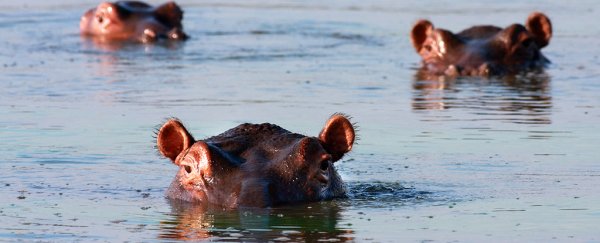Suffocating because of faeces probably ranks pretty high among the most unpleasant ways to die - but that's exactly what happens to fish in Africa's Mara River. Not just once, either. It happens repeatedly, and it turns out the hippos are to blame.
The phenomenon was clocked when researchers noticed dead fish sometimes left behind on the banks when a river rose due to rainfall. Through a series of tests that took several years to complete, researchers were able to identify the offender: water from hippopotamus pools upstream.
"Together, the Mara's resident hippos add about 8,500 kg - or 9.3 tons - of partially digested plant material into the river each day," explained Emma Rosi, an ecologist at the Cary Institute of Ecosystem Studies.
"We were interested in how this massive influx of organic matter and nutrients influenced aquatic life."
It took three years of observations, during which the team monitored the water chemistry from 171 hippo pools and the rest of the river, to find the answer. Because hippos are so dangerous to humans, they had to use remote controlled-boats carrying sensors to test the pools.
When hippos defecate, their faeces sink to the bottom of the river. As the masses of poo decompose, the bacteria devouring it also consume the oxygen in the water, effectively deoxygenating it.
In addition, microbial activity produces chemicals such as ammonium, hydrogen sulfide, methane, and carbon dioxide - the first two of which are potentially toxic to fish.
This state of affairs is fine when the water stays in the hippo pool regions of the river. But it becomes a big problem when heavy rainfall produces flushing flows that wash this anoxic water downstream, into fish habitats.
The sudden influx of oxygen-depleted water can cause temporary hypoxia, and the still-decomposing faeces continues to use up oxygen where it ends up - effectively causing the fish to suffocate.
"Human sewage, drought, hog farms, or cattle pens all can lead to hypoxia but we show it also can be caused by wildlife in unregulated rivers," said David Post, an ecologist at Yale University. "And oxygen is the master variable for all aquatic life."
During the three years, the research team, led by ecologist Christopher Dutton of Yale University, documented 55 flushing flows wherein the river flow increased to twice its normal rate.
Of these, they noted decreased oxygen in 49 - and the oxygen dropped low enough to kill fish 13 times.
But, the team notes, this process is a natural one. As well as cleaning out the river, the flushing flows that kill fish provide a food source for other animals that live in the area, such as birds and crocodiles.
"This appears to be a natural process that may have been more common in Sub-Saharan African rivers prior to the extirpation of hippos from much of their historical range," Dutton explained.
"There's this idea that pristine rivers are not supposed to have dissolved oxygen crashes, but we think this is because generations of scientists have studied places that no longer have intact large wildlife populations, whereas the Mara River is unique because it does.
"This system offers a window into the past and illustrates how ecosystems might have functioned before human impacts."
The study was published in Nature Communications.
